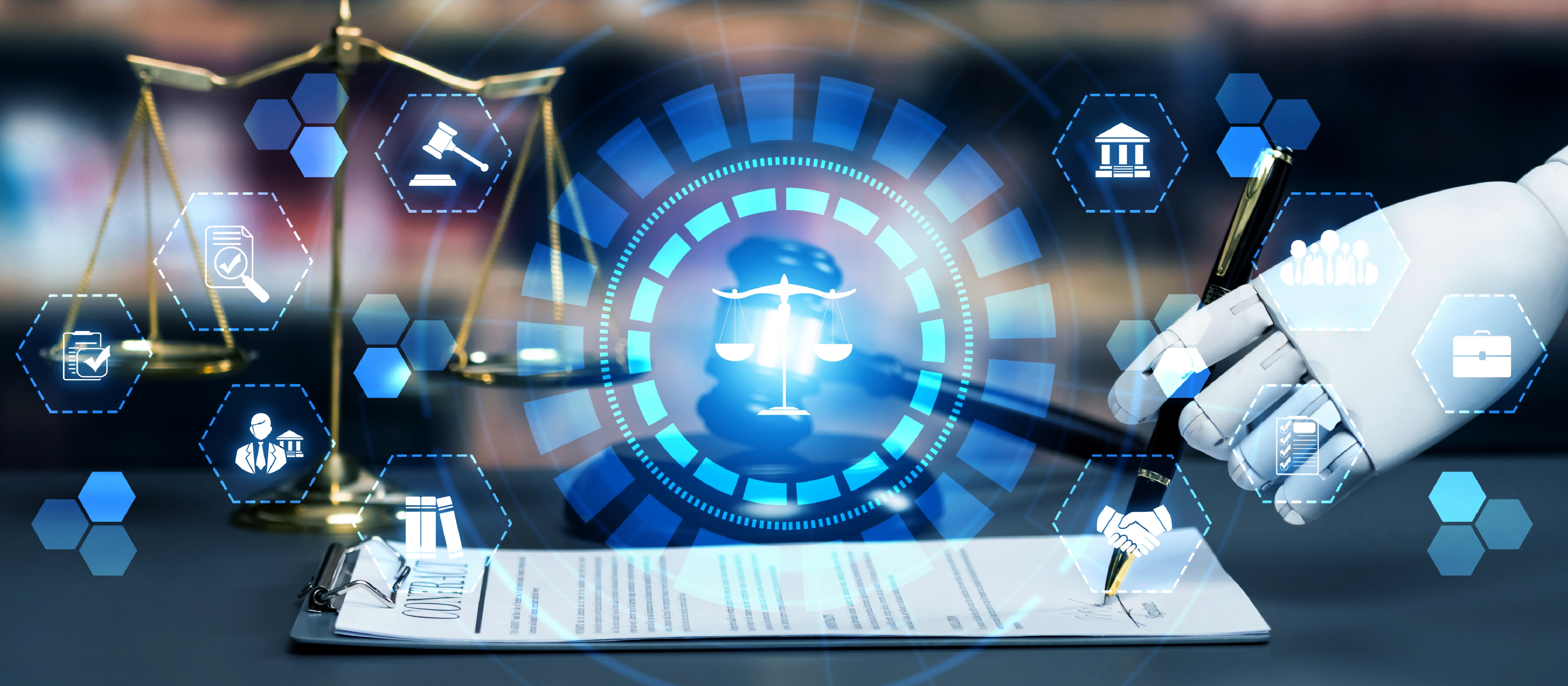In the world of business and law, where the pace of technological development is accelerating, Artificial Intelligence (AI) emerges as a key player in transforming the field of contract analysis. The traditional methods that relied on manual review of contracts, which were labor-intensive and prone to human error, are starting to give way to more efficient, accurate, and cost-effective methods, thanks to the use of artificial intelligence technologies.
In this article, we review how AI algorithms are used to analyze legal contracts in a way that surpasses traditional methods in efficiently identifying contractual issues and clauses, and we invite you to share your opinions and experiences in this field.
Transition from Traditional to Advanced Technology in Contract Analysis
Traditionally, contract analysis has been a complex and time-consuming task that requires extreme precision and significant effort, making it a tedious and lengthy process. However, the introduction of artificial intelligence technologies has brought about a radical transformation in this sector. Now, companies and legal offices can benefit from these technologies to conduct quick and accurate contract analyses in ways that were previously impossible, significantly enhancing efficiency and reducing the effort and time required for this essential process.
Contract analysis using AI is characterized by its ability to rapidly examine documents, with the ability to recognize complex legal language and analyze clauses and conditions with high accuracy. These systems can also track changes in contracts and easily compare them with other documents, helping to identify potential risks and improve contract negotiation and drafting processes.
With this significant shift, we witness a change in the way companies and legal institutions handle contracts, enabling them to make more enlightened and quicker decisions, and achieve a higher level of security and confidence in legal transactions.
How AI Works in Contract Analysis
In the context of contract analysis, AI relies on complex algorithms that integrate Natural Language Processing (NLP) and machine learning technologies. These systems are specifically designed to understand and analyze legal texts with utmost precision, enabling them to effectively identify key and critical clauses in contracts. Thanks to their ability to analyze language and understand contexts, these systems can detect contradictions and potential risks within contracts, enhancing negotiation processes and reducing legal and business risks.
Using AI technologies in contract analysis offers many advantages. For example, these systems can significantly speed up the legal review process, saving time and increasing productivity. Their accuracy in identifying contractual clauses and conditions reduces human error, providing a deeper and more comprehensive understanding of legal risks and obligations.
Achieving Efficiency and Accuracy in Contract Analysis
With the entry of AI into the realm of contract analysis, we have witnessed a noticeable shift in how legal documents are managed and processed. It is now possible to analyze large volumes of contracts with exceptional speed and precision, representing a significant advancement over traditional contract review methods.
This development is not only reflected in the speed of analysis but also in the accuracy of these systems. AI offers analytical capabilities far beyond what humans can achieve, significantly reducing the chances of errors. Additionally, the use of AI in reducing the time required for contract review means lowering the costs associated with these processes.
Automated contract analysis also allows for the quick and efficient identification of patterns, contradictions, and potential risks, aiding companies and legal institutions in making informed decisions based on accurate and comprehensive information. This type of analysis enhances the ability of institutions to handle contracts more effectively and contributes to improving negotiation processes and managing legal risks.
In short, the use of AI in contract analysis opens new doors for achieving efficiency, accuracy, and time and cost savings, paving the way for a new era of effectiveness and productivity in the legal field.
Highlighting Risks and Opportunities
AI technologies used in contract analysis have a remarkable ability to uncover risks and contradictions that may be hidden in legal texts – risks that may be overlooked by human reviewers. This ability goes far beyond mere surface analysis of texts; AI is capable of understanding contexts and linguistic complexities, allowing for a deep and comprehensive analysis of contracts.
One of the most notable advantages of using AI in this field is its ability to accurately identify opportunities and risks. These technologies can analyze contractual clauses and estimate their potential impact, helping to avoid future legal and financial obstacles. They also provide strategic insights that assist institutions in formulating more effective negotiation strategies and making informed decisions.
Additionally, AI can anticipate trends and analyze historical contract data, providing a deeper understanding of patterns and behaviors within the business field. These insights are essential for companies looking to improve their processes and strengthen their negotiating position.
In this way, AI technologies act not only as a valuable tool in contract analysis but also in guiding companies toward making smarter decisions and securing their position in the market.
Synergy Between Human Expertise and AI Technologies in Contract Analysis
Despite the significant advancements in AI technologies specialized in contract analysis, the role of legal experts remains fundamental and vital. The secret lies in the effective integration of the immense capabilities of AI with the deep understanding and precise analysis that lawyers and legal specialists can offer. This collaboration between technology and human expertise enables the achievement of high-quality results in the contract analysis process.
On one hand, AI provides speed and accuracy in processing large amounts of data and identifying patterns and contradictions. On the other hand, legal experts add invaluable insight through their expertise in interpreting legal texts and assessing legal and business complexities related to contracts.
The synergy between AI and human expertise is key to achieving advanced and efficient contract analysis. This collaboration can enhance the capabilities of each party; lawyers benefit from the efficiency and accuracy provided by AI, while AI can benefit from the guidance and assessment offered by human experts.
In this way, the ideal balance between technology and human expertise can be achieved, leading to improved contract analysis processes and more precise and effective results, meeting clients’ needs and elevating the standards of the legal industry.
Addressing Challenges and Developing Solutions in AI
Despite the numerous benefits of using AI in contract analysis, there are several challenges facing this technology, the most prominent being algorithmic bias and concerns related to data privacy. To overcome these challenges, it is essential to develop innovative solutions that include comprehensive and balanced training of algorithms to avoid bias, and adopting strict policies to protect data and ensure its confidentiality. Through these steps, the effectiveness of AI can be enhanced, and users’ trust in this technology can be increased.
In conclusion, the use of AI in contract analysis represents not just a technological improvement but a real revolution that fundamentally changes work methodologies in the legal and business fields. This technological revolution opens doors to new and exciting possibilities in how legal documents are processed, risk analysis is conducted, and strategic decisions are made.
We invite you to share your opinions and experiences regarding the use of AI in legal contract analysis. Have you observed an improvement in efficiency and accuracy in contract review within your institutions? How has the use of these technologies affected your daily work? Your participation will enrich the discussion on this vital topic.


